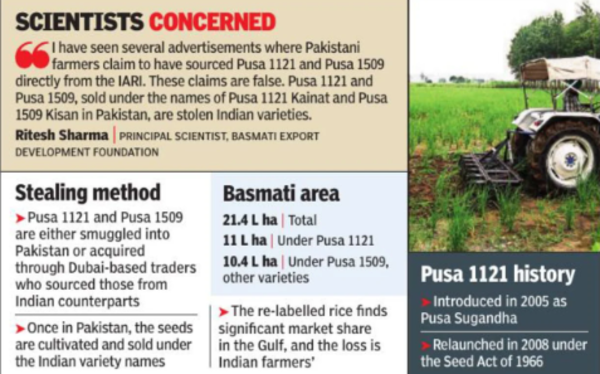AMRITSAR: Pakistani growers are pushing knock-off variations of India’s prized Pusa 1121 and Pusa 1509 basmati rice on social media, concentrating on worldwide markets with imitation varieties marketed as 1121 Kainat and 1509 Kisan, threatening India’s world market share.
Social media is crammed with promotions from Pakistani rice growers, utilizing the names of well-known varieties developed on the Indian Agricultural Analysis Institute (IARI).This pattern has alarmed the Indian rice growers and scientists. Pakistan has lengthy produced and bought these imitation varieties, prompting the Indian govt to boost the problem with their counterparts from throughout the border.

Ritesh Sharma, principal scientist on the Basmati Export Growth Basis below the Agricultural and Processed Meals Merchandise Export Growth Authority (APEDA), mentioned: “It’s unsuitable for Pakistani farmers to falsely promote. I’ve seen a number of commercials the place Pakistani farmers declare to have sourced Pusa 1121 and Pusa 1509 straight from the IARI. The claims made on social media are false. Pusa 1121 and Pusa 1509, bought below the names of Pusa 1121 Kainat and Pusa 1509 Kisan in Pakistan, are stolen varieties.”
India launched Pusa 1121 in 2005 as Pusa Sugandha earlier than relaunching it in 2008 and notified it below the Seed Act of 1966. “Presently, about 21.4 lakh hectares are below basmati cultivation, with about 11 lakh hectares dedicated to Pusa 1121, whereas the remaining are used for Pusa 1509 and different varieties,” Ritesh mentioned. Basmati grower Prabhpal Singh echoed scientiest Ritesh’s considerations, saying, “Pakistani farmers have stolen these varieties from India and are promoting them below the identical names to create confusion within the worldwide market. That is extremely condemnable.”
One other basmati farmer, Baljinder Singh, defined that the seeds of Indian varieties like Pusa 1121 and Pusa 1509 had been both smuggled into Pakistan or acquired via Dubai-based merchants who sourced these from Indian counterparts. As soon as in Pakistan, the seeds are cultivated and bought below the Indian selection names, capturing a major market share within the Gulf area notably, inflicting losses to the Indian farmers.
We additionally printed the next articles lately
Farmers typically overlook the id of cashew varieties after planting. The Cashew Farmers Monitoring System (CFTS) by ICAR-Directorate of Cashew Analysis makes use of QR codes to supply detailed info on bought varieties and monitor planting places. This aids nurseries in monitoring crop unfold and survival charges, enhancing the evaluation of selection affect.
The Ministry of Commerce and Business has eliminated the minimal export value for basmati rice, aiming to extend farmers’ earnings amid enough home provide. The federal government additionally raised the essential responsibility on refined oil to 32.5% to spice up demand for mustard, sunflower, and groundnut crops. Moreover, it abolished the minimal export value on onions.
The Centre has eliminated the minimal export value of $950 per metric tonne on Basmati rice, addressing considerations from Punjab’s rice millers and farmers over falling paddy costs. This choice is predicted to spice up world market entry for Indian Basmati. The export ban on non-Basmati rice stays unchanged.



